Listen (61 Minutes)
Ron Rosedale, there is an increasing rise in neurodegenerative diseases right now. That’s not what we want.
RON ROSEDALE
No, we don’t want diseases, period. Unfortunately, it is part of life. The major problem is not that we’re getting the diseases, but that we’re getting them more frequently and younger. The rise in these chronic diseases—in fact, virtually all chronic diseases—correlates with the patterns of dietary changes that we’ve been seeing, perhaps delayed by 20 or 30 years for the results of the dietary changes to actually manifest themselves. But I think there’s a strong link between diet, metabolism, and all of the chronic diseases of aging, including neurodegenerative diseases.
Not everybody agrees that diet is a major contributor to this increase in neurodegenerative disease. A more widely held medical theory is called the hygiene hypothesis. It says autoimmune and neurodegenerative diseases are increasing because our world has gotten too clean. We don’t have enough germs and dirtiness in the world, we have more vaccines and antibiotics used.
RON ROSEDALE
I recall hearing that at least 20 years ago, and I totally agree with it. I see no fault with that argument. The only fault I see is that that’s the only reason. I think there’s ample evidence to show that the dietary changes, exclusive of cleanliness, have a huge impact on neurodegenerative diseases in addition to our lack of early exposure to antigenic stimuli for our immune system. So I think that that certainly plays a role. I think when you’re exposed early in life to the typical antigens, the typical bacteria and viruses and other immune stimulating effects, it does program our immune system to do what it evolutionarily is supposed to do and therefore help fight disease and not fight itself, not fight your own body. In other words, it helps the body to become less confused as to what is self and what is non-self. That’s a very, very important bit of information that the body requires for its immune system, so the regulatory T cells and inhibitory T cells that prevent overactivity of the immune system are properly developed.
Leptin “Spikes” Increase Risk of Multiple Sclerosis (MS)
But I think there is at least as much evidence to show that the regulatory T cells and the immune system are also very much affected by dietary changes and that these effects can occur almost from day to day, but that metabolic diseases such as leptin resistance have a huge impact on the immune system. Studies show that autoimmune diseases such a animal models of MS almost uniformly show a big rise in leptin prior to the clinical onset of the disease.
When you mentioned that there’s a big rise in leptin before the onset of the disease, I’m trying to picture that. Does that mean that there is a sudden spike one day where leptin levels go 100 times higher than usual? Or does that mean that over time, if you check the fasting level of somebody, that their leptin levels, that hormone in their blood increases consistently and stays high?
RON ROSEDALE
I’ve seen studies to show both. (see If you have a chronically high leptin level, your instance of autoimmune neurological diseases such as MS is greatly increased, and if you suppress leptin chemically, although I would recommend doing it dietarily, you can reduce the risk of onset by a great deal of MS. But I’ve also seen articles that showed a sudden spike, it was 100 times as much, but certainly a several-fold spike in leptin in the weeks prior to the onset of MS, even with a consistent diet. All of the knowledge, all of the pieces have not been put together, but what it does show is a powerful connection between leptin and autoimmune disease, especially MS.
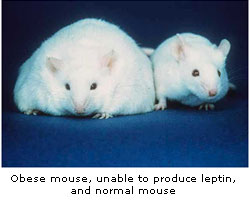 (Editor’s Note – Here are links to some of these studies: A Key Role of Leptin in the control of T-Cell Proliferation, De Rosa V,
(Editor’s Note – Here are links to some of these studies: A Key Role of Leptin in the control of T-Cell Proliferation, De Rosa V,
I’m trying to picture how scientists were able to figure out that a leptin spike could make a difference in this autoimmune disease MS. Very few people get their leptin levels checked very often. How did they figure this out?
I don’t know what was the light bulb initially, other than perhaps the fact that scientists now have been linking leptin with virtually all chronic diseases, so why leave out autoimmune diseases? In addition, leptin levels have been linked with longevity, signs of aging, and certainly autoimmune diseases are a big part of that. Most of the studies on aging, of course, are done on animals, very difficult to do lifespan studies on humans, because they take such a long time. But two of the main causes of death in laboratory animals are cancer and autoimmune disease, so both of those diseases have been studied quite intensively with leptin. Another piece of information that was discovered is that regulatory T cells, part of the white blood cells that tend to regulate the immune response, regulate information, basically keeps it from being like a fire burning out of control, you want a controlled fire, not one that just burns down the forest. Regulatory T cells have receptors for leptin and it has even been found that they can secrete leptin, that the immune system and leptin have a power connection.
T cells I think of as the ones you hear about, attacking the wrong thing when somebody has an autoimmune disease. You hear that their T cells, instead of going after invaders in the body go after the body.
RON ROSEDALE
Right. It gets confused as to what is yourself that should not be attacked and what is something foreign that ought to be attacked. Sometimes it can be difficult to distinguish to two, especially when some of the foods we’re eating are so similar to ourselves. All life, really, is quite similar genetically, and all the cells are quite similar, so it actually takes a very, very acutely intelligent immune system to figure out what is you and what isn’t once things are actually digested. It’s a very important piece of the puzzle in autoimmune diseases, and certainly antibiotics, I feel, play a huge role. Their use is wildly out of control. Everybody’s getting antibiotics. If you get a sore throat, you’ll get an antibiotic, even though 90% of those sore throats are caused by viruses, and the antibiotic, if it does anything, will make it worse. That antibiotic will not just kill so-called pathogenic, disease-causing bacteria, it will also kill the good bacteria that inhabit your throat and your gut and your sinuses and your skin. We need those bacteria. We have evolved with those bacteria. The majority of people don’t realize that in a normal healthy state, we have four times as many bacteria inhabiting our bodies as we have cells. So we’re not talking about a small amount. We’re talking about the majority of cells that actually are part of us, are beneficial bacteria, that we end up at least partially killing when we take antibiotics.
And when we kill those bacteria, they don’t necessarily come back as they were. It allows other pathogenic bacteria to permanently become part of our flora and cause continual problems in our gut, for instance. It’s quite known that when you take antibiotics, you can have an intestinal yeast infection, although many times it’s sub clinical. If it’s bad it’ll cause diarrhea and bloating and gas and somebody will speak up and they still generally don’t find it. But many times you don’t have those overt symptoms, but you can have various stomach aches and pains, or food tolerance becomes less. What it does do is impair, permanently alter your immune system and immune response until you change that bacterial flora, you reduce the amount of yeast, kill off some of the pathogenic bacteria that inhabit the gut secondary to the use of antibiotics and then reintroduce some of the more beneficial bacteria.
But that’s, again, just one small portion of the story. Then you have the dietary impact on insulin and leptin and their impact on the T cells and other immune modulators and its effect on bone and the effects of bone on the immune system, as we’ve talked about in the past. There’s a huge connection between autoimmune disease, the immune system, and survivability, disease, and diet. The reason, really, is that diet is important. You can’t live without eating, you can’t reproduce without eating, and that’s what nature wants. Nature wants you to be able to at least reach reproductive age. Nature has all sorts of mechanisms to try and ensure that at least we get to reproductive age. After that it doesn’t really care that much.
That’s why some of these autoimmune diseases are so troubling, because some of them right now, more frequently than ever before, are disabling and killing people in their reproductive years.
RON ROSEDALE
That’s why it’s becoming more known, I think if a person gets a disease when they’re 90 years old, we say, “You’re 90 years old, what do you expect?” Now that they’re starting to get these diseases at a younger age, during and even before reproductive age, it starts raising alarms. We have so many different adverse lifestyle changes now that are extremely unnatural, we’ve not seen in our evolutionary history until recently. Some of what you mentioned before, the cleanliness, we’re just not exposed to the proper antigens, adverse bugs, that we should be when we’re young so our immune system doesn’t develop properly. And then we have chronically high levels of glucose, of insulin, of leptin, all of which then further impair the ability of our immune system to properly function. And all of these things are coming together to cause disease such that for the first time in mankind, its predicted lifespan is going to decrease, as opposed to constantly increasing throughout our known history.
You mentioned one way that we might be able to reduce this tide, and that is what we put in our mouths. If we can reduce the amount of antibiotic we put in our mouths, that might give our guts a better chance to be healthy for when we digest food, so we don’t end up with a confused immune system because of poor digestion. That’s one side that you’ve described. But you’re also saying that the actual food that people eat and how it affects the hormones in our bodies will also affect how well our immune system makes sense of what’s going on. What is it that makes leptin levels go up? What makes insulin levels go up?
RON ROSEDALE
Let’s talk about insulin first. It actually is a bit simpler. What we know makes insulin go up are glucose levels in the blood. When they go up, insulin goes up to store the excess, not to lower the blood sugar. That’s a huge misconception not just among the public but among almost all physicians. We’re taught in medical school that the purpose of insulin is to regulate blood sugar, and that couldn’t be further from the truth. The purpose of insulin is to store excess nutrients for a future time of need. That’s even a minor purpose of insulin. We can get into the major purpose of insulin later.
When sugar goes up in your bloodstream, when it spikes up, you have food that increases blood sugar, which might be an innocuous as a potato, or rice, which the whole world seems to be eating in overabundance, bread and pasta and cereals, Breakfast of Champions, all of these things will cause the body to manufacture a lot of sugar from the food. Starch in your mouth will be broken down by the amylase in the saliva into blood sugar, and the blood sugar will rise quite rapidly. You won’t be able to burn it as rapidly, unless you’re sprinting while you’re eating, and then you will raise your blood sugar, and that’s a sign that you’ve got more nutrients available now than you can burn, so your body wants to save that. We come from a history of feast and famine, and your body is not going to want to waste those nutrients, so you’ll save it for a future less opportune time when food might not have been available. Tomorrow you might have to fast. In our evolutionary history, food wasn’t available all the time. It was feast or famine. If it was famine tomorrow, you wanted to save those excess nutrients from today. You’ll store them. You’ll store a little bit as a biological starch called glycogen, but mostly you’ll convert it into fat, which is our major energy supply and major energy storage, or it least it’s supposed to be our major energy supply.
The signal to do all these physiologic things with the excess nutrient is mostly insulin. Insulin will go up and change the way that your genes are being read and it will say, “Hey, you’ve got a bunch of fuel right now. Let’s take the excess and store it and let’s do something with what we’ve got.” In our evolutionary history, when there was an overabundance of food or just an abundance of food, it’ll say that cells should reproduce. You’ve got enough energy now that you can reproduce, make a new you, make a new cell. So when we talk about reproduction here, we’re not necessarily talking about making a new person, we’re talking about making a new cell. You’ve got energy available. You can now make cells to replace old damaged cells, but it will do so by changing certain genetic pathways, turning the switch to on, which when left unregulated because of impaired immune system, let’s say, will lead to cancer.
So not only are you giving a switch that is telling cells to reproduce, but you’re also then damaging the control of that reproduction from the immune system and the end result is an increase in cancer. Now we know, and I mentioned this at least 20 years ago, that when insulin levels are high, you will have an increase in cancer, and that’s proving to be somewhat prophetic, because now they’re showing that many different kinds of cancer are related to glucose and insulin levels, and leptin levels, too, by the way. They’re all related.
It’s very, very important not to let glucose and insulin levels spike by the foods that will generally raise those, which are sugars, obviously, and starches. When I mention the sugars, it has to be recognized we’re not just talking about the glycemic index here. The glycemic index just measures glucose, it just measures sugar. So many people now feel that they can have fructose, things like agave are being espoused on talk shows as a wonderful thing to have, when in fact agave is 90% fructose, and fructose doesn’t raise blood glucose, it raises blood fructose. And so it doesn’t have a high glycemic index, which is why they’re saying it’s healthy, but it does many other really adverse things, such as cause the liver to produce fat, some of which then ends up standing in the liver and causing a fatty liver, so that your liver actually gets obese and it can’t then have proper blood circulation and can’t receive proper hormonal signals from insulin, which normally tells the liver to stop manufacturing sugar, so the liver overmanufactures glucose so you wake up in the morning and your sugars are high, even though you haven’t eaten, and that’s what you see in diabetics.
We’re talking about diseases such as diabetes and cancer and heart disease, too, which have these kinds of connections. How does this tie in with autoimmune diseases, with the fact that T cells can get confused and other hormonal signals in the body can get messed up so that, for instance, nerves in the body start to be attacked by the body and don’t get repaired?
Our Body Works Best Like an Orchestra
RON ROSEDALE
 The way the body functions really is, I guess, more akin to the music being played by an orchestra. If you impair one part of that orchestra, some of the signaling from the violins, all the rest of the music becomes impaired. But especially if the conductor starts having a twitch in his arm, you’re going to have a real problem. That conductor to me right now is leptin. I was one of the first people to talk about the importance of insulin decades ago, and insulin is still extremely important, but leptin, in humans, anyway, perhaps might even be more important. It’s so universally dysfunctional in people that it then trickles down to every biological process in the body, including the way the liver functions or diabetes. It controls insulin production and reception. It controls bone growth and repair. It controls the vascular function, having to do with hypertension and cardiovascular diseases. It has a lot to do with cancer. And as we’ve talked about previously, it has a whole lot to do with autoimmune disease in many different ways, part of which is the regulation or at least partial regulation of the regulatory T cell by blood cells, which help keep the immune system from going overboard.
The way the body functions really is, I guess, more akin to the music being played by an orchestra. If you impair one part of that orchestra, some of the signaling from the violins, all the rest of the music becomes impaired. But especially if the conductor starts having a twitch in his arm, you’re going to have a real problem. That conductor to me right now is leptin. I was one of the first people to talk about the importance of insulin decades ago, and insulin is still extremely important, but leptin, in humans, anyway, perhaps might even be more important. It’s so universally dysfunctional in people that it then trickles down to every biological process in the body, including the way the liver functions or diabetes. It controls insulin production and reception. It controls bone growth and repair. It controls the vascular function, having to do with hypertension and cardiovascular diseases. It has a lot to do with cancer. And as we’ve talked about previously, it has a whole lot to do with autoimmune disease in many different ways, part of which is the regulation or at least partial regulation of the regulatory T cell by blood cells, which help keep the immune system from going overboard.
Ron Rosedale, I’m confused. I’ve done a very light look at some of the medical treatments for autoimmune diseases. For a lot of diseases there are anti-inflammatory drugs given. Lots of steroids are used in treating autoimmune diseases. Also different drugs that either boost or tamp down on a neurotransmitter kind of signal that goes to the nerves. I don’t see very many medical treatments that have to do with cooling off leptin.
RON ROSEDALE
No, there aren’t, and the reason for that is, there’s no money in it. It might sound kind of a simple and flippant remark, but it’s true. The only therapies that make their way into standard medical care are those that can be patented and profited from, huge profits. It takes quite a bit of money to get FDA approval for something, and you have to make money off o it. All of these are corporate-sponsored and corporate-controlled, and the purpose of corporations is to make money.
You might be right about that. But I can’t go to a pharmaceutical company and ask them about their motivation. It’s not something that I can double-check with them to see what they say about that. But one thing that I can do is look at what some of the treatments are for some autoimmune diseases and start to compare them. What if I pretend that I’m a consumer who wants to make an informed decision, and I want to look at what the treatments out there are and what some of the alternatives are. What if we focused on something like multiple sclerosis, for instance, MS? It’s a disease that’s on the rise in the U.S. It’s hitting people at younger ages. There are a lot of different ways it can be treated.
There are drugs called acetylcholinesterase inhibitors that are one of the common treatments for MS, I believe. Steroids are another. There are different interferons that are given. I don’t know exactly what all these things are. Is it worthwhile to explain some of them?
RON ROSEDALE
The real short answer is no, because none of them work.
If somebody wants to take these kind of medication because they’re desperate or worried or they’ve been told they might work, what’s the harm?
RON ROSEDALE
The harm is that they have adverse side effects. Most of these medication inhibit the immune system. They’re kind of shotguns. They don’t just inhibit the immune system attacking the myelin sheath of nerves, which is what causes MS, so some of the bigger nerves have a fatty layer above them basically as an insulator, just like when you insulate an electrical wire. If you don’t have that insulation, the electrons can just go everywhere instead of to the intended target. That’s one of the major purposes of the myelin fatty sheath that’s around the major nerves. It also can aid in the speed of transmission to the nerves. So the myelin sheath is quite important. What happens in MS, for instance, is that the immune system attacks that myelin sheath, basically pokes holes in it, and that interferes with electrical connectivity in those nerves.
You make it sound like the nerves get frayed, just like an electrical wire.
RON ROSEDALE
The sheath of the nerves gets frayed, you might say. They have holes in them. It’s I think fairly accepted that it’s because of the overactive immune system that a person’s own immune system attacks the myelin sheath, so it’s in the class of disease we call autoimmune disease.
When you say that the problem is that it’s an overactive immune system, that puzzles me, because a number of the treatments for these kinds of diseases and other diseases is to look at the disease and say, “These nerves are not working as well, so we need to boost the signal, push them harder, because the signal isn’t getting through.” Someone with MS, for instance, may have trouble walking, using their hands. In more severe cases, they may have trouble breathing, and it’s because the nerve signal isn’t getting through. So one logic of medical treatments can be to figure out whatever way they can to boost the signal, because the instruction isn’t getting through to the nerves, so why not push the signal louder?
RON ROSEDALE
The problem with that is, global movements, instead of fine-tuned movement, it takes a hammer and just pounds away at the piano instead of nicely playing tunes with one’s fingers. When you just increase nerve signals, you’re not just increasing it in those areas of the nerves that require it. You’re increasing it everywhere. You might benefit a couple nerves that maybe have a big of slow transmission because of myelin damage, but then what about all the other nerves that have the right transmission that you’re now overaccelerating? This is how people die in most cases of severe snakebite and other toxic animal bites. What these venoms do is inhibit our ability to break down that neurotransmitter called acetylcholine, so when your nerves produce acetylcholine, it goes from one nerve to the next as kind of a messenger, and it tells the next nerve to go ahead and transmit your signal. But then you have to get rid of that acetylcholine or it keeps telling the same message over and over again long after it shouldn’t. You have to then break that acetylcholine down, and the body does it through a chemical called a cholinesterase. The toxins that nature produces for animals to kill other animals is called an acetylcholinesterase inhibitor.
I’ve seen that as the mechanism of action for drug treatments that are designed to treat these nerve-destroying conditions.
RON ROSEDALE
Right. And the problem is that it won’t just do it in one particular nerve, let alone one particular place or a few different places on a particular nerve or even a few nerves. It does it everywhere, because that acetylcholine is universal throughout the body, it’s one of the major neurotransmitters, and it’s used everywhere. So by increasing the message in one place that maybe you need to increase the signal in that place because it’s damaged, you don’t want to increase it everywhere else because you’re doing the same thing, then, that a venomous snakebite does. You’re damaging the other nerves and the other signals and that actually then will ultimately cause resistance to acetylcholine, so it first will cause damage from too much and then you cause damage from too little.
We don’t know enough to specific exactly where, when, and how to place a signal. Not just in this disease, but in any disease. The problem with diabetes, for instance, is the orchestration of the signals. People take insulin when their insulin resistance—for instance, the vast majority of diabetics are diabetic because their cells are not able to listen to insulin. They have enough of it. In fact, most of them have too much of it. But certain cells are not able to listen to it. Other cells are getting too much. Not all the cells in the body are equally resistant. The liver might be more resistant than the cells that line the arteries. So then when you give the person more insulin so that the liver gets the message to stop making excess sugar, that same more insulin is going to expose the cells that line the arteries, the endothelial cells, to even more insulin signal, which will cause the endothelium to proliferate, it is a signal for the endothelial cells that lines the arteries to multiply, high insulin is a signal to reproduce, the signal that you’ve got lots of nutrition available and it’s a good time to reproduce. The endothelial cells will reproduce, it’ll produce fat and plaque and it will plug your arteries. And that’s just one simple example. And it’s not a hypothetical example, it’s a real example.
So when you take excess insulin, when you’re taking insulin for a type 2 diabetic, it might lower your sugar, but it’s causing all these other effects that are adverse because of the high insulin effects on the cells that are already exposed to high insulin. And that’s the problem with a lack of orchestration. That’s just uniform. We are not advanced enough in medicine to treat a particular signal in a particular spot at a particular time. That’s what it required for health. That’s how you play music. You don’t just constantly press one key all the time. You’ve got to press it now and then let, and then press a different key now and then let go. And then you get a musical score. And that musical score you might consider to be health.
A lot of medical doctors and pharmaceutical companies would say that they have very finely calibrated their medications for diseases such as autoimmune diseases so they’re at just the right level that they don’t cause harm but instead cause benefit in the same way that a signal from our own body is able to go in and get a signal to the nerves to do some kind of action and then step back. The rationale that I’ve heard from medical researchers and doctors about why to give these kinds of medications is that overall, on the balance, the whole body is pulled back from where it should be in sending out signals, for instance in someone with MS, so what else can they do but use their very finely calibrated, very carefully played drug applications to improve the signal to those nerves?
RON ROSEDALE
None of the drugs for MS work. They have no cure for MS. They have no help for MS in standard medical care.
That’s not what I hear from people who support these kinds of applications, this kind of medication.
RON ROSEDALE
That’s what the studies will say. In fact, a friend of mine was just diagnosed with MS and is seeing one of the top MS doctors, supposedly, in the world, who is going to put her on one of the newest and bestest drugs for MS called Copaxone. The generic name is glatiramer acetate. Very expensive, I think it costs in the neighborhood of $10,000 or $20,000 a month. It’s ridiculous. It’s given by injection only. And that’s one of the newest and bestest drugs for MS, given by one of the top experts in the field. Here is a summary from the Cochrane Report. The Cochrane Collaboration is a group that synthesizes all of the known information and they make a report. They take all of the studies and reports of drugs and look at it all together and they essentially give their opinion as to the effectiveness of this drug. Here is what it says about glatiramer acetate, one of the supposedly best drugs for MS. It’s a very long report. At the end there is a plain-language summary: “The data show no beneficial effects on disease progression in both MS forms.” Period. Both MS forms is, there’s a relapsing-remitting form and a progressive form of MS, otherwise known as RRMS and PMS. I will repeat that. “The data show no beneficial effects on disease progression in both MS forms. Adverse effects such as flushing, chest tightness, sweating, complications, anxiety, and local injection site reactions occurred quite frequently.”
And I would add, after looking at that drug a little bit more, that what you will see, although they can’t show it in a short period of it, is a great increase in cancer due to its adverse effects on the immune system.
(Editor’s Note: Here is a link to the Cochrane Collaboration Report on Glatriamer Acetate for Multiple Sclerosis)
If there’s no benefit, why is it out there on the market?
RON ROSEDALE
It essentially works by reducing the immune system, by reducing T cell activity. It reduces the effectiveness of the immune system and therefore it will supposedly reduce the immune system’s effect on the myelin sheath. But the problem is, it doesn’t just reduce the effects on the myelin sheath, it reduces the effects on everything. Everything the immune system is for, to protect you from infections, from cancer. I didn’t say that early, but you require a very powerful immune system to protect yourself from cancer. Cancer, if it gets by other regulatory systems in the body, is hopefully recognized as a foreign agent like a bacteria or a virus, and that cancer cell will be mopped up by your immune system and won’t give you overt kinds of cancer. You won’t come up with what we call cancer, even though you might have millions of cancer cells in your body. People are getting cancer every five minutes, every hour, I don’t know. Cancer is very common. The body has mechanisms to keep it in check or even succumb to it or even know that we have had it. But that requires a very powerful immune system.
Most of the treatments for cancer basically wipe out the immune system, such as chemotherapy, and then people end up dying. That’s why I say that unfortunately our medical system really is in an infantile stage, and we’re going to be looked at by future generations just like we look at medicine from the medieval ages. We are no more advanced, perhaps less advanced now, then we were then.
I can sympathize with a doctor who rationalizes that cancer tends to kill people slowly, further out in time. Severe incidents of MS can kill someone quickly. Can it be that this drug is suggested as a way to buy somebody more time by increasing the risk of a disease that might happen later to stop a disease that’s happening right now?
RON ROSEDALE
No, not if it doesn’t help the disease. This isn’t saying that the drug just has side effects, it’s saying that it doesn’t help MS. It doesn’t help MS, but has bad side effects. There’s no excuse for that. Doctors when they get their licenses take a Hippocratic oath, the joke goes that it’s a hypocritic oath. And it really is a hypocritic oath, because the doctors take the oath and throw it away. The first thing they’ll do is forget about it, because virtually every drug they prescribe has adverse effects. So the Hippocratic oath, paraphrased, “At least do no harm.” And doctors do harm all the time, but they’re trying to weigh, like you just mentioned, the benefits versus the risks. Unfortunately, the risk generally far outweighs the benefit, or the benefit is short-term or a long-term, even more detrimental adverse effect.
We’re supposed to have a whole system of checks and balances to try to keep the risk-benefit ratio in the favor of the patient who needs better health. We have the FDA that’s supposed to safeguard people against drugs that aren’t supposed to be—that might harm them. We have a huge layer of different agencies and different regulations to try to prevent a drug that is not going to be useful and might cause more side effects that are harmful than it causes benefits.
RON ROSEDALE
We could talk for hours about how the system is broken. And then there’s the way that the pharmaceutical companies do studies. There’s many way to statistically twist results or even when they design the study to begin with, they’ll design it basically for deceptive purposes. They’ll design a study to show benefit and mask the side effects. For instance, if you knew it took so many patients so many years to show a positive cancer effect, you’ll make s you’re that you use fewer years and fewer patients so that that cancer effect doesn’t show up, and so that the positive effect might show up in a particular age group after the results are done, and then you can throw away the results of all the other age groups, because you’re not required to show negative results.
So you’re not in favor of medications that knock out the immune system’s T cells? You don’t think that’s the way to go. What about ones that—and you’re not in favor of medications that boost the signal of the neurotransmitter acetylcholine. You’re not in favor of medications that either repress how quickly the body recycles or just simply rev up that signal, because that can end up ripping up a lot of the nervous system. How about steroids?
RON ROSEDALE
Steroids are known to impair the immune system, and yes, they definitely are a common treatment, and it’s been shown over many decades that the negative side effects there far outweigh the benefits. Steroids will impair your immune system, so we know that it increases your risk of infection, of cancer. We know that it also increases blood sugar and can actually cause overt diabetes. It also breaks down protein tissues that can make you more osteoporotic, make you weaker. There are so many adverse effects of taking corticosteroids that it really is almost beyond the scope of this discussion. One should totally forget that as a treatment for any type of chronic disease.
What you do see are certain treatments being totally ignored because there is no money behind it. A pharmaceutical company is not going to be going around to doctors and saying that there is a key role of leptin in the control of regulatory T cell proliferation. And that is the title of an article that came out quite a while ago that when leptin is high, it reduces regulatory T cells. Really one of the Holy Grails of autoimmune diseases is to increase regulatory T cells, not reduce the immune system, but reduce the part of the immune system that is attacking one’s own tissue. That is the function of the regulatory T cells. They regulate T cell function, as their name implies. They prevent out-of-control burning, you might say, of tissues by the immune system. Regulatory T cells are a real hot topic in autoimmune disorders. It’s been known now for several years that one of the major regulators of regulatory T cells is leptin. When you inhibit leptin, it increases regulatory T cells. There have been many more than one study that have shown this.
But the key there is that leptin levels change with every meal. So if you eat a meal to keep your leptin levels low, you will up-regulate your regulatory cells. And that’s what you want for autoimmune diseases, that’s what you want for cancer, that’s what you want for virtually anything that has to do with proper functioning and health. That’s very important.
And then there’s another article, “The interface between immune and metabolic regulation: a role for leptin in the pathogenesis of multiple sclerosis.” It’s not just in the treatment, but it shows that disregulation [?] of leptin might be a major cause of multiple sclerosis in the first place. Why not go right to the source.
Ron, would you be comfortable if I posted on the Internet not only the title of those articles but the authors and a way to find the citation?
RON ROSEDALE
No, that’d be fine.
Here’s my hope. Today there’s enough information that’s available to people that they can do their own checking to see what makes sense to them. It’s also my hope that if something makes enough sense, it might actually be worth doing and it might make a difference. Perhaps we’re in a time where people look for a path of information that they can check out for themselves, and they might find some good answers.
RON ROSEDALE
They might. People really have to start taking their health into their own control, because unfortunately, standard medical care really is controlled by large corporations. No, you can’t necessarily look into their minds, but I think most people understand what the major purpose of large corporations is, and it has very little if anything to do with health and much more to do with wealth. Another thing I want to mention is, when you get a lot of different lines of research intersecting at one point, you really have to start paying attention. Another line of research, for instance, is just showing how sugar itself, high glucose, is associated with multiple sclerosis, and when you prevent high glucose, MS can be reduced. Again, that gets you back to insulin and gets you back to leptin and metabolic control in general. The two major metabolic hormones are insulin and leptin, and they’re called metabolic hormones because their major influence is what you eat. So it’s extremely important—and there’s mechanistic actions. We even know why. There’s good scientific physiology as to why this even might be so. It’s not just hocus-pocus. With glucose, for instance, they talk about the glycation of cholinesterase and cholinesterase inhibitors. We’ve known about glycation for quite some time. We’ve talked about it before. Glycation can really mess up proper functioning of proteins.
I think I hear you saying that if you make acetylcholinesterase, which is the nerve transmitter, get too sticky and gummed up with sugar stuck to it, it’s going to do some things that it shouldn’t, and it’s not going to work in some places that it’s needed. If you glycate, if you gum up acetylcholinesterase, the stuff that inhibits and recycles the nerve transmitter, then it may not be there to act when it’s needed, or it may bungle into something else because it’s all gummed up and hurt it just because it’s all gummed up.
RON ROSEDALE
And even more so the receptors. The receptors are proteins, too. They can get glycated or, as you mentioned, “gummed up” by glucose, “caramelized,” another scientifically colloquial term for glycation is “caramelization.” It’s not just a picture but it’s true. Caramel is basically caramelization of cream. So if you add glucose and cream, you get caramel. The same thing happens in your body. It’s one of the major mechanisms that is studied in the biology of aging. We know that glycation can came damage and that damage will accrue, and a lot of that accrual we see as the damage or senescence associated with getting older. So wrinkles and cataracts and all these things we know are directly attributable to glycation or caramelization. But other things caramelize, receptors or hormones, even the neurotransmitters are a type of hormone like acetylcholine. They glycate and the acetylcholine itself can glycate, but that may not be as important because it doesn’t last that long, so it gets mopped up.
What does happen is, whenever anything glycates, the body has to get rid of that glycation. That’s now a damaging protein, so we know that it stimulates the immune system and stimulates macrophages, which are part of the immune system, to clean up that gummed-up, caramelized protein, so it will then attack the caramelization, which could be one of the causes also of MS. So when you glycate nerves, you stimulate the immune system to have to clean up that caramelization, and it might go a little overboard and damage some of the nerves even more so as a result of having been glycated.
So there’s a lot of damaging effects of the glucose itself, but glucose’s effects on other very powerful hormones such as insulin and leptin, which then have global effects throughout the body on all of the chronic diseases of aging because of their effects on the actual biology and rate of aging itself. And that aging then has symptoms that we know of as the damage associated with aging, such as autoimmune disease and cancer and obesity and diabetes and rheumatoid arthritis and osteoporosis. All of these are symptoms of getting older that are accelerated, we know, when insulin and leptin and certain other metabolic signals are elevated.
Ron Rosedale, you have spent your career looking at these diseases and focusing on the disease initially as insulin. Does it surprise you to see a resonance of some of the mechanisms you’ve seen for what causes a disease like diabetes happen in a disease such as multiple sclerosis?
RON ROSEDALE
It just makes sense. I went out on a limb many year ago and predicted a lot of these things, but there was no real science behind it. Now, 20 years later, a lot of the science is supporting it. But it made sense then, and it makes more sense now. The science was just so powerful and in some cases so obvious that it really is frustrating that it is not being utilized. It’s very basic. When I still see studies coming out that low-carbohydrate, so-called ketogenic diets can help epilepsy or be beneficial for diabetics as if it’s new information, when 20 years ago I started talking about this, we’ve talked about this before, too, but when I first started talking about this, I was very shy to talk about it. I started treating my patients, I was working in basically a practice that had lots of cardiovascular patients, they were there to treat their cardiovascular disease, and many of these people also had diabetes. I was treating them with a diet that I will maintain to this very day hasn’t changed one bit, not anything about this diet has changed. All I did literally, probably in an hour, I sat down, thought of a diet that would not raise blood sugar. In grade school we’re taught that starches turn to sugar. So there go the starches. A little research showed that we don’t need any in the diet, that the minimum daily requirement of carbohydrate is zero. So I just wiped those out.
I knew that proteins could turn to sugar, but we needed some protein, it is required, so I moderated the protein and figured out how much protein a person should have depending on their lean mass and realized that what you have left is fat. A little research on fat showed that it was metabolized differently, was actually a much cleaner fuel, and that the medical degradation of fat, what’s the word? desecration of fat was totally wrong. We were being told to eat a low-fat diet, when in fact it should be quite the opposite. That should be our major source of fuel. So I started people on essentially a higher-fat, very low-carb, very low starch, moderate-protein diet. All the other low-carb diets are kind of going towards what I was espousing originally.
And it shows up in many places in surprising ways. I’m hoping to talk to some researcher who are close to Johns Hopkins who have been doing some studies with rodents where they poison the rodents with something called soman poisoning. It basically does what a snakebite does. It’s a poison that was used in wars. Interestingly enough, in this study, the rodents that they had on a glucose diet died very quickly, the ones on a standard died about half as fast or as slowly. But they put some of these rodents on a ketogenic diet, high-fat, adequate protein, very low-carb. Those rodents for the most part survived the poisoning. It was very interesting to read some of the possibilities. They talked about glycation, about the fact that basically the body stayed cooler, and they didn’t use quite that word, but they described a situation where the toxic effects were able to be processed out more efficiently.
There were some interesting things about that. If I were to be persuaded that the kind of diet that you recommend might be therapeutic, that would be a scary step for somebody who’s at the point of one of these diseases where it’s threatening their health, it’s painful, it’s threatening their mobility or maybe even their life. If I put myself in the shoes of someone like that, that would be a very scary time to try to raise my hopes towards changing how I eat to see if it could make a difference. Is there’s a point where it’s too late to even try?)
RON ROSEDALE
No, no, there’s never a point where it’s too late to try, until they’re basically beyond dead.
Even in the study of the rodents that was done close to Johns Hopkins at an Army Institute, what they noticed was that if they shifted animals to this kind of diet for just 24 hours, they got sicker. They showed more signs of illness. If instead they had been accustomed to this diet for 48 hours, just another day, they did much better. I don’t know whether they poisoned the rodents after they were adapted for 48 hours or if they tried to switch them. I don’t know what would happen if someone sick and you switched their diet in the middle of them being sick to something that’s different—
IRON ROSEDALE
I can virtually assure you that the adverse feelings that one gets by switching their diet will be far less than what they would feel with chemotherapy or with a drug akin to snake venom. The adaptation to this type of diet exists. One must adapt. In humans it takes between two and three weeks to adapt to this form of diet. But with adaptation, we know that when you adopt and adapt to this diet, you will lose excess fluid that you’ve been retaining perhaps for decades because of high insulin, one of the ramifications being fluid and sodium retention, so when your insulin goes down, you’ll lose that fluid loss, and with fluid loss you lose potassium, and many people who adopt this diet and who do not supplement with potassium, just like you would do if you had a diuretic, you have to do the same thing, if you do that, the adaptation really is much less. Most of the adverse side effects one gets when they adopt this sort of diet is that they don’t take certain supplements that should be taken to ease that transition. But they don’t really notice great improvement for several weeks, as your body starts learning how to burn fat. Basically, the mechanisms to burn fat have been hibernating for so long that it takes a while to wake up that genetic machinery to manufacture the enzymes and other chemicals necessary to process fat as fuel. The adaptation is so much less, and the benefits are so great, as opposed to the side effects and lack of benefits when they take some of the ___ treatment for MS or cancer or any of the things that basically are really treated inadequately at best.
Medicine is pretty much held on a pedestal. You have all this fancy machinery and you walk around in white coats and you get something that’s $10,000 to $20,000 a month therapy, it’s got to be doing something. You can’t believe that it really does nothing and it’s more harmful than not. People want some sort of hope. They want to do something. And when you have supposed experts telling you to do something, that this will be good for you, you listen to them, because you figure you’re not an expert and they’re more of an expert and they know what they’re doing. They might have very nice personalities. Maybe they’re even great people. Maybe they want to help. Maybe they even believe that they’re helping. But the cold, hard, scientific facts are that they’re not, and the vast majority of chronic diseases, including heart disease, the control of cholesterol and cancer therapies and the treatment for diabetes, all of these things really are causing much more harm, not just a little bit more harm, but much more harm than if they did nothing. And I’m not even saying do nothing. I’m saying, just change your diet. Diet is really, really powerful. I know that everybody says, “OK, we know that eating well is helpful.” If you eat just right to control really powerful hormones such as leptin and insulin, you can make huge changes in your health. You can not just help prevent disease, we’re not talking about preventive medicine here. We’re talking about therapeutic medicine. We’re talking about treating cancer, treating autoimmune disease, reversing heart disease and high blood pressure and diabetes and obesity. We’re doing that by really getting much further to the root of those diseases, because we’re delving into the actual aging process and therefore the symptoms of aging, because we know that these hormones are not just—probably control the rate of aging. It’s been shown now in many species of laboratory animals that there’s a genetic mechanism that actually regulates the rate of aging, which has to do with nature’s desire to have animals live long enough to reproduce. There’s a strong synergy between diet, reproduction, and rate of aging. All animals that are on earth today evolved with that synergy in mind. So diet, what a person eats, controls and expresses, changed genetic expression of very powerful genes that then essentially affect every process in the body.
It basically boils down to one thing. If you just have to summarize all of this stuff we’ve been saying, you can make huge changes in your health if you switch from burning sugar to burning fat. The body functions really, really differently. You will be much healthier, you will improve your immune system function, not just in fighting infections and fighting cancer, but also preventing it from overfighting, which would manifest as autoimmune diseases, by burning fat. It’s a totally different type of fuel. The body functions extremely different when you burn fat from when you burn sugar. We were never designed to burn sugar extensively. It’s a major problem with the diseases of civilization. The whole world is not primarily burning sugar as its primary fuel, and that has to do with what people are being fed and what the medical profession has told people to eat. The medical profession told people, “Don’t eat fat. Eat carbohydrates. Eat a high-carbohydrate, low-fat diet.” That’s been their mantra over half a century. That’s been a killer. There has never been in the history of mankind worse advice than that. It was actually based on nothing. You don’t get any nutritional training in medical school, so why they said that in the first place is really beyond me. It was what I would call “kindergarten medicine.” They noticed fatty fats in arteries, so they said, “If you eat fat, it’s going to stick to your arteries and kill you.” And that’s literally what caused fat to be blamed for heart disease. No scientific merit, no studies, nothing really of substance to implicate that.
The body doesn’t work that way. The body is far more complex than that. The body is regulated by instructions and by signals, and if you have signals to build up plaque in your arteries, you’ll do it. If you have signals to burn fat or to burn sugar, you’ll do that. Your cells are living that line your arteries, and they can burn fat or sugar, too. If they’re burning fat, they’re going to keep themselves clean. Whether you burn fat or sugar is regulated by the same powerful hormones that regulate aging, leptin and insulin. It regulates all of the—since it affects and even controls, to a great extent, the rate of aging, it will affect those processes that also affect the rate of aging, such as immunity, autoimmunity, cancer, diabetes, overabundance or not of fat. Everything that we notice detrimental that happens when we age is going to be controlled by those hormones that are controlled by what we eat.
Thank you and good luck to your friend. Sometimes I think the hardest thing is to watch someone you care about, where you hope that they could get better, and they don’t want to do it your way.
RON ROSEDALE
It’s rather frustrating. There’s a lot of money and advertising, lots of marketing that goes behind the standard of medical care. It’s very hard to fight, but we have to.



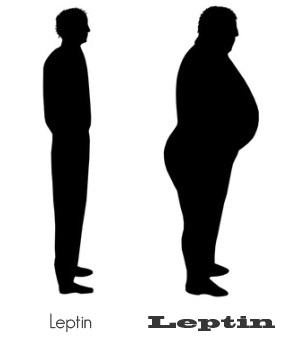
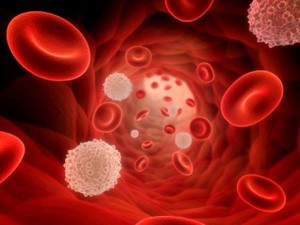






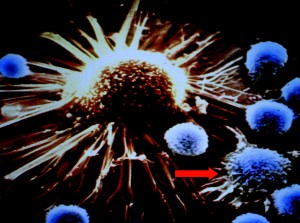


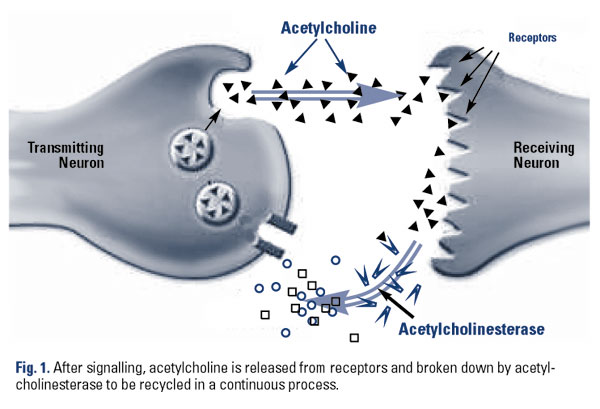



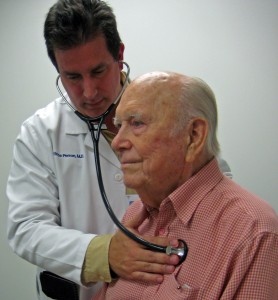


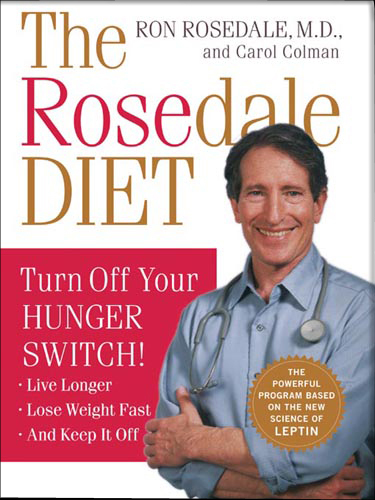





9 comments for “Ron Rosedale – Neurodegenerative Disease, Hormones and Diet”